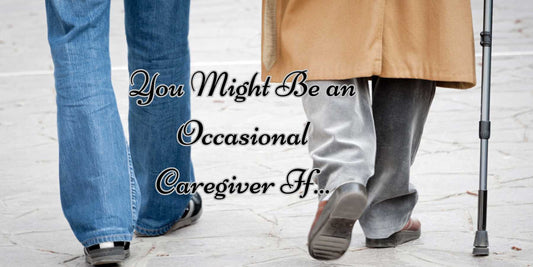For my entire life my grandmother had narcolepsy. This disease prevented her from being able to stay awake which often impacted her ability to function on a daily basis. Then, in my teens she had to have her leg amputated. I was incredibly close to her, so I have done intermittent caregiving almost my whole life. Even if it was just being asking as a child, to go get her pills from her nightstand.
Intermittent caregiving is possibly the most silent type of caregiving. The occasional Dr visits, the occasional hospital stay. But that doesn’t mean it doesn’t affect you or take a toll on your own emotional and physical well-being.
Tips

Be aware of simultaneous balancing acts
All caregiving to some degree is multiple balancing acts. However, Intermittent Caregiving might the most delicate balancing act, yet. Unlike Immediate (i.e. surgery) and Long Term (i.e. cancer or alzheimers) caregiving, your loved one doesn’t need constant care.
So you are constantly balancing the care they are willing to have you help them with and what they are doing themselves. Maybe if an appointment is in the morning they feel comfortable enough to drive. But if an appointment in the late afternoon it might be a different situation.
You are most likely balancing their needs with your job, which can be difficult depending on your employer and their policies. Some companies are starting to offer some type of caregiver benefits. Check out your company’s policies or with HR to understand any caregiver benefits they offer, if anything.
You are also trying to balance your emotions. Things your loved ones used to be able to do easily, now might be more challenging for them. That’s hard to watch. But then on others days they are their normal selves. So you question if you were imaging they are having a bit more trouble than they used to. That’s normal. Embrace all the feelings and emotions you have.
Communicate with your loved one
You might *think* you know what is best for them, but ask what they want or need. I wasn’t super good at this, but I did get better over time. I think I’ve done a better job with my Mom than I did with my Grandma. You won’t be perfect at this, and that’s okay.
Rotate with family or friends
If possible, take others up on their offer to help. Or ask if they can take your loved to a doctor’s visit or lab appointment. It can be difficult to ask or allow others to help you. It does provide your loved one, someone else to talk to and provides the person you ask an opportunity to be useful too. It also helps you have one less appointment on your already full calendar. A win, win, win situation all around.
Encourage their independence
As intermitted caregiving gets more frequent, it’s really easy for you to try to do more them. However, the better thing to do is encourage your loved one to still partake in actives and events they enjoy. It’s hard to do this, but you both will benefit from their acts of independence.
For example: Could you make those cookies and decorate them faster, probably. But they are enjoying the process. Let them and encourage it. This will help their own well-being too. And if you have to walk away, walk away. Come back and offer to help clean up if they would like help. But be prepared for them to say “No, thanks”. Honor that too.
Resources

Support Groups
I will admit, this isn’t something that I personally took advantage of, but there are numerous support groups for family caregivers.
Caregiver Action Network
Is a great resource for any caregiver at any stage of caregiving. I wish I had found them earlier.
Go to Caregiver Action Network website
Courageously Living’s Caregiving Support Cards and Journal Gift Set
Caregiving is hard. It can often feel like you’re doing everything wrong. This gift card set was created to help you acknowledge and ease your stress and frustration while doing caregiving.
Shop Caregiver gifts for others or yourself





